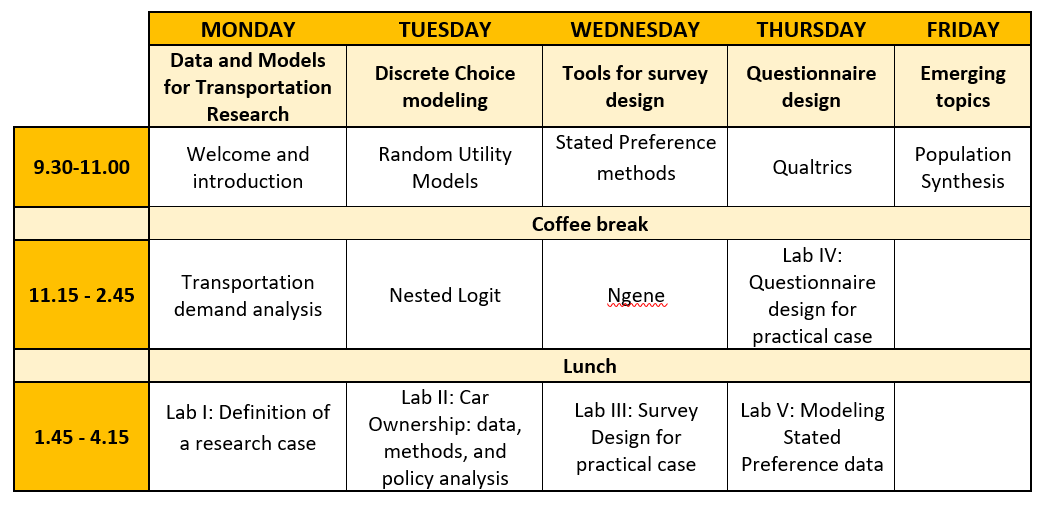Summer Course on
DATA AND METHODS FOR TRANSPORTATION MODELERS AND PLANNERS
Instructors: Cinzia Cirillo, Javier Bas
Course Dates: May 18th to May 22th, 2020
- Monday to Thursday: 9.30 – 12.30 (1 coffee break) and 1.45 – 4.00 (1 coffee break)
- Friday: 9.30 – 12.30 (1 coffee break)
Course Fee:
- Student $1,000
- Academic $1,500
- Other Professionals $2,500
The fee includes 4 lunches
Course Content
This course is addressed to consultants, governmental agencies, academics, and graduate students who intends to acquire the tools necessary to work with data and models for transportation demand analysis. The classes will guide the participants in the definition of the transportation related problem, collection of the data, model estimation, and policy evaluation.
The instructors, who are well established leaders in the field, will give the basics of data analysis and DCM theory and will adopt a practical approach to real case studies. The program offered at the University of Maryland presents an entry level to the field, covering the basic concepts, and provides a glimpse of advanced data analysis techniques and modeling constructs.
Attendees will learn how to analyze data from the National Household Travel Survey (NHTS), to design Stated Preference surveys and collect data, and to estimate behavioral models using Discrete Choice techniques. The participants will learn orthogonal and optimal design techniques, and will use Ngene and Qualtrics software. They will also estimate, validate and apply discrete choice models using real data and state-of-the-art software (Biogeme, R).
WHO SHOULD ATTEND
This program is intended for professionals interested in understanding travel behavior, and evaluate policies using state of the art data, models, and software. It may also be beneficial to public officials who need to acquire the necessary knowledge to design, develop, or manage transportation and/or urban plans. Students and researchers will also find the program particularly useful as it offers rigorous training and preparation for successful independent research.
Course can be used used for 1 Professional Development Hour for Professional Engineers in Maryland, District of Columbia, and Virginia.
PROGRAM OUTLINE
Day 1: Data and Models for transportation demand analysis
9.30–11.00 Welcome and Introduction.
- Outline and schedule
- Conducting a project for transportation demand modeling: practical examples
11.15–12.45 Transportation demand analysis
- Discrete Choice Models in transportation research projects:
four Step Models and Activity Based Models
- Survey and non-Survey data for Transportation Studies
1.45 – 4.15 Lab I: Definition of a research case
- Identifying data and modeling needs for a practical case study
- Working with the National Household Travel Survey (NHTS) data
Day 2: Discrete Choice Modeling
9.30–11.00 Random Utility Models (RUM)
- Multinomial Logit: Derivation of probabilities
- Power and limitations of Logit
- Elasticities
- Estimation
- Goodness of fit and Hypothesis testing
11.15–12.45 Nested Logit
- Substitution patterns
- Choice probabilities
- Estimation
1.45 – 4.15 Lab II: Case study: The Car Ownership problem: data, methods, and policy analysis.
Day 3: Tools for survey design
9.30–11.00 Stated Preference Methods
- The definition of the experimental design
- Design of choice experiments
11.15–12.45 Ngene
- User interface
- Syntax
1.45 – 4.15 Lab III: Survey Design for a practical case study
Day 4: Questionnaire design
9.30–11.00 Qualtrics
- User interface
- Questions
- Survey flow
11.15–12.45 Lab IV: Questionnaire design for practical case study
1.45 – 4.15 Lab V: Modeling Stated Preference Data
Day 5: Emerging topics in Transportation
9.30–11.00 Population Synthesis
- Methods and results for a real case study

About the Instructors:
Cinzia Cirillo is a Full Professor at the University of Maryland, Department of Civil and Environmental Engineering. Her specialty areas are in transport modeling techniques and survey instruments, application of advanced statistical and econometrics methods, and on the analysis of their results to predict consumer demand and behavior for various transportation options. She is conducting projects in the US, in Europe and in the Middle East, she has also taught advanced classes in China and Taiwan. Her current research is about dynamic discrete choice models, discrete-continuous models, and their application to the market penetration of new technology vehicles. Recently, one of her PhD students won the Eric Pas prize with a thesis on social interactions in activity and travel behavior models.
Javier Bas is a PhD student at the University of Maryland, Department of Civil and Environmental Engineering. His specialty areas are in transport modeling and advanced econometrics methods. His background in Economics and Econometrics allowed him to work in welfare measures associated to changes in toll policy. Currently, he is working in predicting the diffusion of the electric vehicle considering social conformity aspects and social network structure. Prior to joining the doctorate program, he worked in the consultancy industry for several years, developing international projects in Economics and Business. He also taught Statistics, Econometrics and Microeconomics in European universities.
Top